One of the most popular and at the same time expensive base oils in cosmetology is jojoba oil. Strictly speaking, it is not exactly an oil, but rather a liquid wax that is obtained from the nuts of plants growing in the deserts of North America. The reputation of this oil is confirmed by more than a thousand years of history. It is completely unique in its chemical composition and beneficial properties, which are not lost even during long-term storage. Today we propose to talk about why and how to use jojoba oil, we will talk about its composition, dosages, and provide several beauty recipes using this component.
Main characteristics
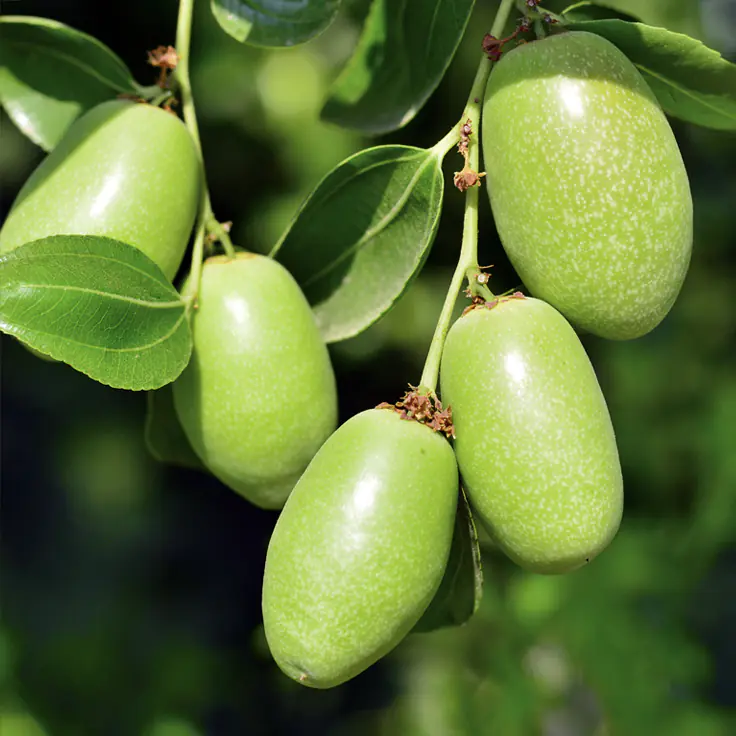
In general, jojoba oil is extracted by cold pressing the nuts. During production, it retains absolutely all fatty acids, and due to the fact that it contains a huge amount of protein and vitamin E, jojoba moves from the category of ordinary base oils into a collection of the most effective antioxidants, agents that can quickly eliminate any inflammation.
One of the main characteristics of this oil is considered to be its high resistance to oxidation. This means that the aroma oil does not deteriorate and does not lose its unique properties over time, while being an ideal basis for dissolving any essential oils. Experts note: you can use jojoba oil in its pure form, but it is best to use it as a 10% solution, mixing it with other vegetable oils.
Jojoba is characterized by a light, almost imperceptible odor and a rich golden color. The oil changes its physical characteristics: at cold temperatures it hardens to the state of a waxy paste, and when warm it becomes relatively liquid. Cosmetologists note: jojoba is the only base oil that does not leave behind a greasy shine on either the skin or hair. At the same time, it is able to form a dense protective layer.
Jojoba oil: composition
You can purchase this product at any pharmacies and cosmetic stores. In addition, you can also find granules of jojoba wax on the shelves, which were prepared by hydrogenation. You can add such granules to homemade cosmetics. The study of the composition and properties of jojoba began in the seventies of the last century. Researchers were able to find out that this oil is quite close in its biochemical composition to spermaceti. This is the name of a unique substance that was previously extracted from the frontal part of the head of sperm whales.
The main components of jojoba oil include fatty acids and their esters, amino acids, collagen, vitamin E, and carotenoids. Let us note that this composition is truly unique: it does not replicate any of the known vegetable oils. In addition to the fact that this composition has beneficial properties for the skin, it provides the oil with high stability: jojoba is not afraid of exposure to sunlight, oxidation and heat. Moreover, the oil can be stored for a long time even without the use of any additives. For this reason, it is often used as a preservative in the manufacture of cosmetics.
Use in cosmetology
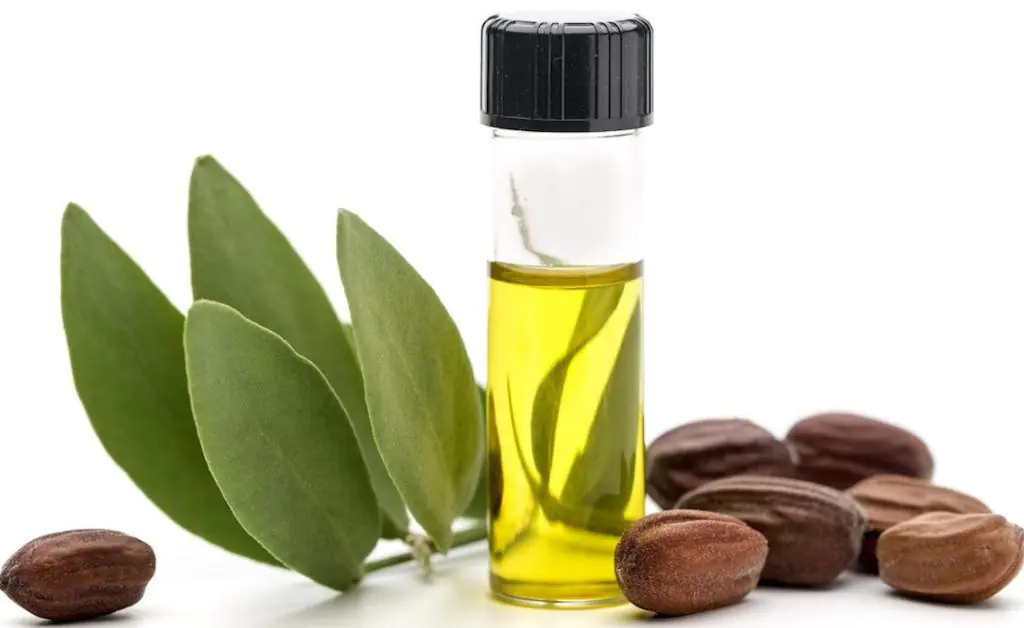
The use of jojoba oil, according to cosmetologists, is almost limitless: it is an ideal component for basic and specialized skin care not only for the face, but also for the décolleté and neck. The product moisturizes and nourishes the skin, restores damage, relieves irritation, redness and inflammation. Jojoba is even suitable for caring for delicate skin around the eyes that requires special attention; it can be used in the manufacture of various vitamin applications and patches. Jojoba oil is also an excellent base for masks. The product has proven effective in treating chapped skin, including on the lips; it quickly eliminates rashes and cracking.
Cosmetologists note: the oil has anti-inflammatory properties, can stimulate the regeneration of skin cells, quickly heals cracks, injuries, cuts, dermatitis and irritation. Moreover, it can also be used in the fight against cellulite and to eliminate stretch marks. One more advantage of jojoba oil for the body, hands, and face should be noted: it is suitable for absolutely any skin type, and can be used by those with oily, normal, dry, problem skin - regardless of age.
Other positive properties of oil in cosmetology include protective, rejuvenating and cleansing. In addition, it can be used even by women who often experience allergic reactions to any skin care cosmetics.
Dosage Features
Using jojoba oil is not difficult: in order to enrich the cream or lotion, you need to add 15% of this oil to the finished composition. Jojoba oil for the face - in its pure form, mixed with other base oils - can be used for daily skin care after cleansing. If you want to prepare a nutritious mixture, combine jojoba, olive, apricot kernel and avocado oils in equal parts; for every two tablespoons of this mixture you will need one drop of lemon or orange essential oil.
If your skin is prone to flaking, you can use a tablespoon of jojoba oil with two drops of lavender. For aging skin, instead of lavender, patchouli oil is suitable, and tea tree oil can cope with the problems of skin prone to rashes. In order to obtain a suitable composition for the delicate skin around the eyes, you can add a drop of fennel or mint oil to jojoba oil. To care for lips with jojoba, it is better to combine lemon balm.
Using jojoba oil, you can prepare a unique smoothing mixture that can eliminate stretch marks: you need to combine jojoba, avocado, lavender, orange, mint and rosemary.
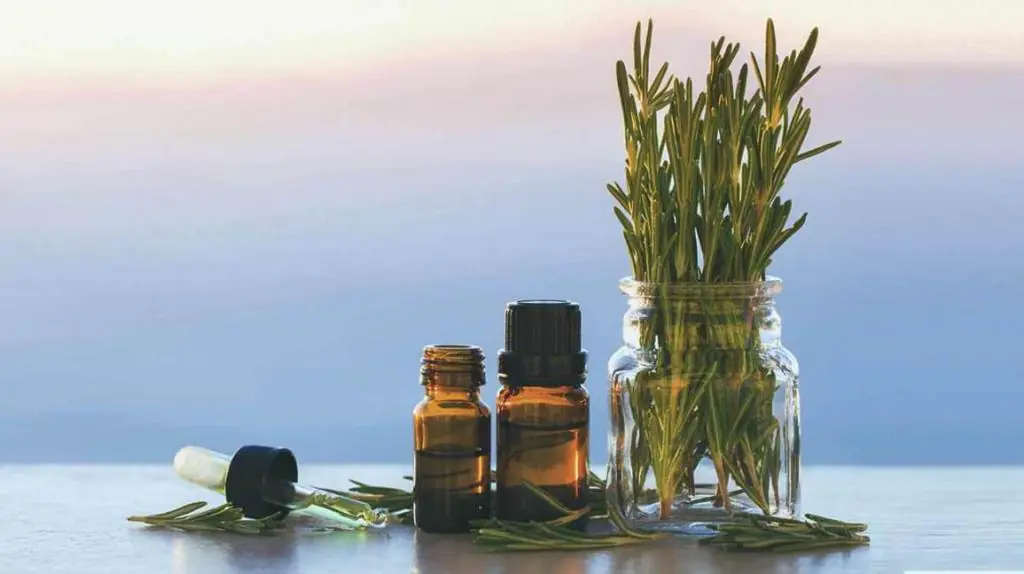
To care for your hair, you can add about 5 drops of jojoba oil to your shampoo or conditioner. At the same time, if it is important to solve the problem of hair loss, it is recommended to add sage and eucalyptus oil. A combination of jojoba, ylang-ylang and orange will help with dry hair; this composition must be applied to a wooden comb, which you use to comb your hair after washing. What else is jojoba oil good for? Experts talk about the effectiveness of massages, applications and compresses for various skin lesions.
Oil damage
Speaking about the use of this amazing oil, it should be noted that individual intolerance to it is a rather rare phenomenon. However, before the first use, it is recommended to carry out a test: one drop of oil should be rubbed into the wrist. After half an hour, you should evaluate the condition of the skin: if redness appears, it is better to stop using the oil. If you decide to use jojoba oil daily all over your facial skin (especially if it is oily), you may trigger active sebaceous gland activity. The result is numerous inflammations.
How to choose quality oil
High-quality oil is usually sold in small bottles made of dark glass. The list of main producing countries includes the United States of America, Australia, Mexico, Egypt, Brazil, Argentina, Peru and Israel. It should be noted that in cold climatic conditions this plant is simply not able to survive, and therefore it is enough to look at the specified country to recognize a fake. It is best to store this oil in the refrigerator; before use, you need to heat only the amount that is needed to prepare the cosmetic product. This can be done either at room temperature or using a water bath. By the way, unlike other vegetable oils, this can be stored for several years - due to the fact that it contains a large amount of ceramides, which do not allow it to oxidize.
Application for face
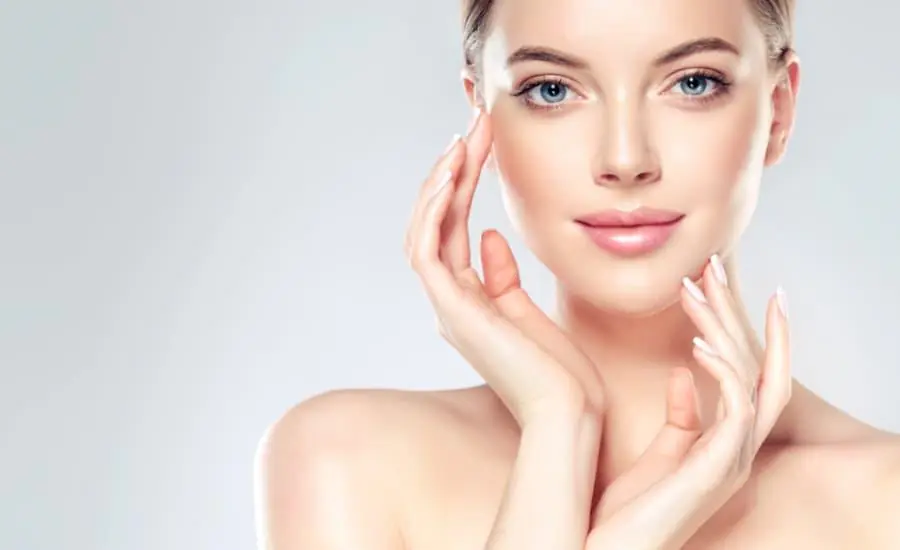
This unique oil is widely used in the field of facial skin care. Its delicate texture allows it to be quickly absorbed, without leaving any greasy shine or unpleasant sticky film. The product does not clog pores, allows the skin to breathe freely and maintains its natural moisture level. You can use oil-wax for all areas of the face.
The product increases elasticity and firmness, makes the skin smooth and soft. Jojoba oil is widely used for the face against wrinkles, post-acne, dull skin color, swelling and acne. Some women use jojoba as a sunscreen if their skin is sensitive to ultraviolet light. You can apply it before tanning: powerful natural filters will not allow the skin to burn or redden, and the fabrics will not lose moisture in the sun. It is also recommended to use jojoba oil in the cold season: it will protect against hypothermia, chapping, and prevent flaking of the skin.
For body
Cosmetologists recommend using jojoba oil for the entire body: this will maintain a normal level of moisture and elasticity of the skin, make it tightened, and eliminate stretch marks. Regular application of the product to the neck, décolleté, and arms will help you look young and attractive longer. It should be noted that jojoba oil does an excellent job of removing rough tissue on the knees, palms, feet and elbows. It can also be used for cellulite changes in the skin, both for existing problems and as a preventive measure.
For curls
When talking about what jojoba oil can be used for, we cannot fail to mention hair. Wax from seeds nourishes and moisturizes curls from roots to ends, restores structure, solving the problem of dandruff, normalizing the functioning of the sebaceous glands. Indications for wax use include the following:
- dry hair;
- lack of volume;
- dandruff;
- slow hair growth or loss;
- increased greasiness;
- damage due to chemical perms, bleaching, frequent use of straightening irons, hair dryers and curling irons.
For eyelashes
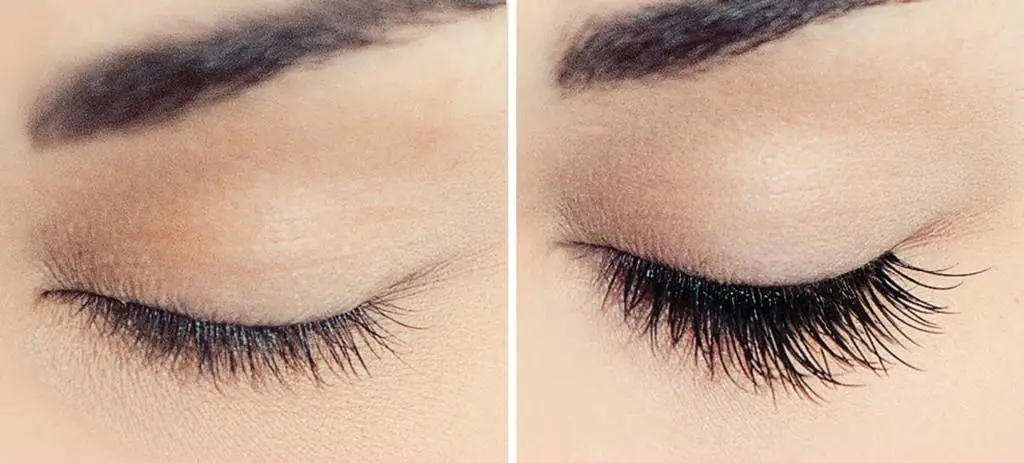
Do your eyelashes fall out, break or grow poorly? Jojoba oil, used in its pure form, works real miracles. It should be applied along the edges of the eyelids, thereby nourishing the follicles and strengthening the eyelashes. In addition, this allows you to awaken the bulbs, which are currently in the sleep phase. This significantly increases the volume of eyelashes, they become darker, longer, and the look becomes more expressive. You can use jojoba oil to remove eye makeup.
Home Recipes
There are a huge number of ways to use jojoba oil when preparing homemade cosmetics. It can be used in its pure form, in combination with other oils or products.
Use undiluted
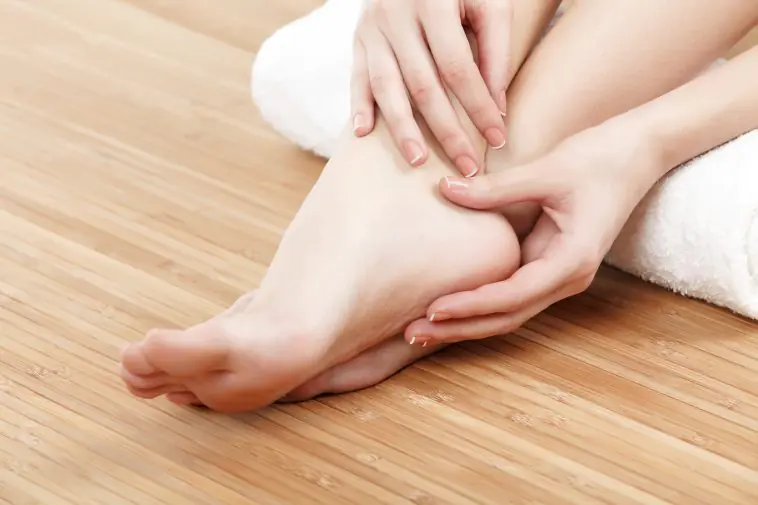
Why is jojoba oil used in its pure form? Cosmetologists say: this product should be applied to those areas where the skin is especially dry, dense or rough, for example, on the elbows, knees, lips or heels. It is recommended to repeat the procedure only a couple of times a week. You should be especially careful when using pure oil on your face: this can eliminate deep wrinkles, but too frequent use of wax can clog the cells. The best way to use pure oil is as a mask or application. It is enough to apply the product to the skin with a brush or soak a cloth with it. After fifteen minutes, it is recommended to rinse off the product with warm water.
For wrinkles
Thinking about using jojoba oil on your face for wrinkles? You will need the following ingredients:
- one chicken yolk;
- a teaspoon of fat sour cream or cream;
- a tablespoon of jojoba oil;
- a teaspoon of liquid honey.
Preparation of the product is quite simple: you need to heat the honey and oil in a water bath, add the remaining ingredients, apply the product to the skin and leave for 20 minutes. After the specified time, it is recommended to wash off the mask with warm water.
For acne and oily skin
Worried about acne, oily and greasy skin? Try making a composition with the following ingredients:
- one tablespoon each of jojoba oil and white or blue clay;
- some warm water;
- half a tablespoon of calendula tincture;
- a couple drops of lavender essential oil.
Preparing the product is quite simple: you need to dilute the clay in warm water and add the remaining ingredients to it, mix well. The resulting mask should be applied to the skin. After the mixture dries, it should be washed off with warm water. After this, it is recommended to apply any moisturizer to the skin.
For hair
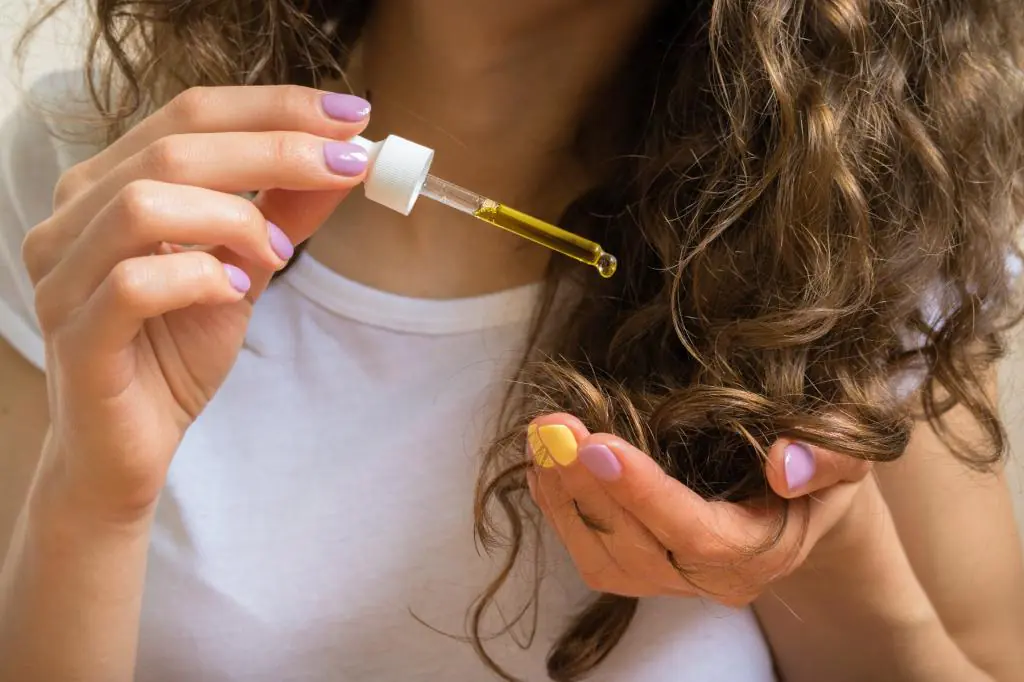
What is jojoba oil used for hair? It allows you to solve problems such as damage and dryness, brittle hair, and slow growth. To prepare the mask you will need:
- a tablespoon of melted honey;
- 1 egg yolk;
- two tablespoons of jojoba wax;
- a couple of drops of sandalwood or neroli essential oil.
The main component of the product – jojoba – needs to be heated and the rest of the mask components added to it. The composition must be applied to the root part, and only then distributed over the entire length of the hair. It is recommended to warm the mask, keep it on your hair for 30-40 minutes, then rinse thoroughly with shampoo.
Jojoba oil is also suitable for oily hair. To do this, 1 tablespoon of the product must be mixed with two tablespoons of lemon juice and the pulp of one avocado. The composition must be applied to damp hair, rubbed in, and rinsed off after an hour.
For dry and sensitive skin
When talking about using jojoba oil for the eyes or for sensitive facial skin, cosmetologists recommend preparing a nourishing and moisturizing product from the following components:
- a tablespoon of jojoba oil and full-fat cottage cheese;
- a teaspoon of freshly squeezed carrot juice.
Preparation will only take a few minutes: the oil must be heated in a water bath, mix the juice and cottage cheese in a separate bowl, add warm oil and apply to the face for 15 minutes. After this, the remnants of the mask should be removed with a soft cloth and washed with warm water.
For hands
The skin of the hands is daily exposed to the adverse effects of temperature changes, ultraviolet radiation, comes into contact with hard water, household chemicals, and therefore needs daily protection, moisturizing and nutrition. Jojoba oil will help cope with this task. You can prepare various care products for your hands. We offer a composition that is suitable for daily use. The list of components is simple:
- ¼ part of a glass of jojoba oil, the same amount of emulsion wax;
- 50 ml water;
- 10-15 drops each of patchouli and incense oils.
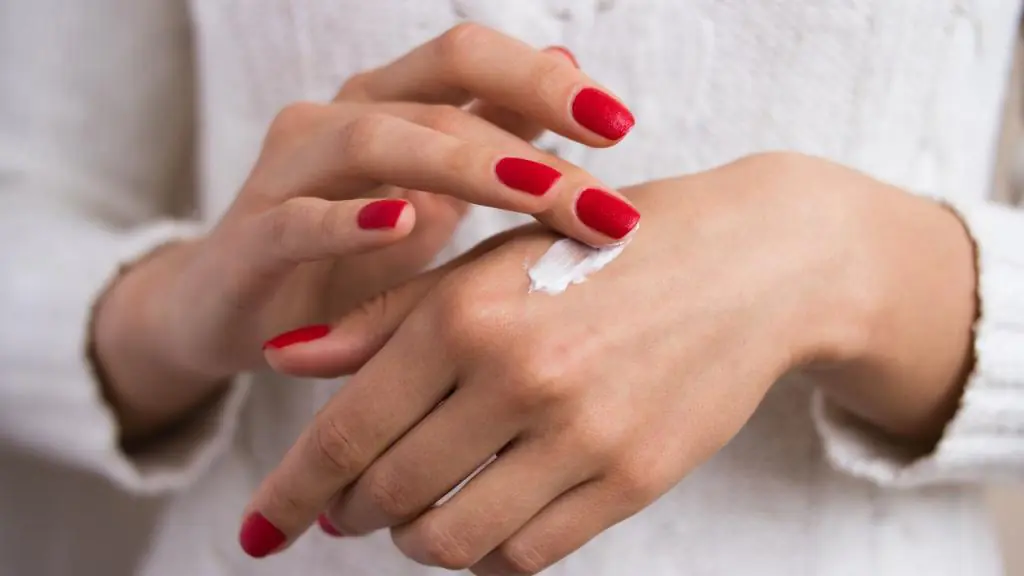
In order to prepare such a homemade cream, it is recommended to combine wax and oil, heat them in a water bath and mix, then add essential oil, heat the water in a separate container to 40-50 degrees, and add to the composition. After this, all components must be thoroughly mixed again, poured into a glass jar and left in the refrigerator. The product can only be applied to clean hands.
6 comments
Are you one of those women who are constantly searching for natural and effective face and body care products? Then today's information is undoubtedly for you. The popularity of home cosmetology using vegetable oils, waxes, esters, and all kinds of plant extracts has simply gone off scale in recent years.
And it’s not just that the most productive cosmetics have incredible prices. And the fact is that a number of products that are freely available are precisely the basis of these most expensive creams, balms, lotions and other products for the beauty and health of skin and hair. One of these “elixirs of youth” is cosmetic jojoba oil.
The use of an oil extract obtained by cold pressing from the fruits (nuts) of the evergreen plant Symmondia sinensis, better known as jojoba or jojoba, is widely used in the cosmetic and pharmaceutical industries, as well as in the manufacture of various lubricants.
The properties of jojoba oil have been used for effective treatment and care of all parts of the body since ancient Egypt. Our ancestors maintained beauty with the help of a miraculous elixir, using it to take care of the health and youth of the skin, hair, eyelashes, lips and face.
Meet jojoba oil
This ingredient is found everywhere in various care products designed to care for the skin and its appendages. So what is jojoba oil, and why does it take pride of place in both traditional and home cosmetology?
Strictly speaking, oil is not a vegetable oil that is familiar to us. A yellow fatty substance with a golden tint can be classified as a liquid polyunsaturated wax. The consistency and composition of the extract are closest to the fat produced by the skin, due to which jojoba freely penetrates into the deep layers of the epidermis, saturating the cells with healing phytocomponents.
Jojoba is resistant to oxidation due to the high content of ceramides in it, that is, it does not go rancid for a long time even when in contact with air, which cannot be said about oils such as flaxseed or nut. That is why cosmetic manufacturers massively use jojoba oil in many lines. Unrefined oil has a light nutty aroma, while refined oil has virtually no odor. At room temperature, spruce remains in liquid form.
The nourishing elixir is valued both as an independent complete product for face and hair care, and as an ideal conductor and base for auxiliary products, such as essential oils or medicinal plant extracts.
Purchasing a product today is not difficult, even if you live in remote regions. The elixir is produced by many cosmetic and pharmaceutical companies. You can buy jojoba oil in pharmacies, shops selling eco-products, and in online stores, usually in bottles of 10, 25, 30, 50 and 100 ml.
Composition and beneficial properties
The product contains lipids (monounsaturated and polyunsaturated fatty acids, including oleic, gadoleic, erucic), amino acids (essential and essential), fat-soluble vitamins - tocopherols (E) and retinol (A), B complex vitamins, micro- and macroelements ( zinc, chromium, silicon, selenium, copper).
Oil extract - a wax-like substance - has powerful regenerating, anti-inflammatory, restorative, rejuvenating, antifungal, antioxidant, softening and moisturizing properties.
It is used not only in cosmetic skin care, but also in the treatment of dermatological problems: wounds, ulcers, psoriasis, eczema, neurodermatitis, dermatitis, acne, sunburn, etc. Jojoba oil is suitable for the delicate skin of infants, softening, protecting and nourishing it , as well as preventing the appearance of abrasions and diaper rash.
Use of jojoba oil in cosmetology
The amazing properties of the product for the skin lie in the biochemical composition of the oil. First of all, we are talking about amino acids in the composition of protein compounds, reminiscent in their structure of collagen fibers, which are the basis of the skin framework.
With age, the amount of collagen decreases, which affects the elasticity of the dermis. Therefore, products that enrich the epithelium with additional amino acids restore the framework and maintain elasticity. The elixir has hypoallergenic properties, which makes it possible to use it for all skin types, including delicate infant skin.
Use on the face
The product is useful for all types and ages of skin, from children's skin to flabby, age-related skin. The use of jojoba oil in its pure form or as a base (masks, creams, lotions, balms) works selectively for each skin type:
- relieves inflammation, reduces the intensity of the sebaceous glands, softens sebaceous plugs, cleanses and tightens the pores of oily, problem and combination skin;
- saturates with moisture, eliminates flaking, nourishes dry and thin skin;
- strengthens, compacts and increases the turgor of loose and wrinkled skin;
- tightens the oval of an older face;
- reduces irritation of sensitive skin;
- regenerates damaged skin areas, smoothing scars and scars.
The oil is quickly absorbed, leaving no greasy shine or sticky film on the skin. The product is suitable for use as a day and night cream. During the cold season, an invisible film that does not interfere with cellular respiration protects the face from wind and frost.
The easiest way to use jojoba oil is to apply the heated mixture to all areas of the face after preliminary cleansing with light patting movements until completely absorbed. The same product is recommended for delicate makeup removal, removing remnants of makeup from eyelashes, lips and skin.
Jojoba oil for hair, eyelashes and eyebrows
According to experienced trichologists, the use of jojoba oil for hair problems is justified and can improve the condition of the scalp in cases of baldness (complete or partial), seborrhea, slower hair growth, increased hair loss associated with stress or vitamin deficiency (provided that treatment carried out from the inside).
Treatments with oil help soften the scalp, eliminate irritation, cleanse the hair follicles of sebum, so that hairs begin to grow from follicles freed from plugs. The delicate texture of oil wax promotes lamination and healing of microdamage to the rods, thereby eliminating the problem of split ends.
The simplest procedure with the elixir is wax wrapping. To do this, you will need to heat 1-2 tablespoons of jojoba in a water bath and apply the product evenly along the entire length of the strands. The contact time of the oil with the curls is 20-30 minutes. To enhance the effect, the head is covered with polyethylene and wrapped in a terry towel heated on a radiator. Next, the hair is washed with shampoo and conditioner is used.
The beneficial properties of jojoba are also useful in caring for eyelashes and eyebrows. Regular application of the product makes them more obedient, accelerates growth, eliminates bald spots and gaps in the growth line. The combination of jojoba, castor and burdock oils (1:1:1) is especially appreciated. The composition is applied to the eyelashes using a clean and dry brush moistened with it.
Using oil for massage
Jojoba oil for the body can be used as a softening lotion or massage product. The effectiveness of massage increases significantly if you use healing oil wax in its pure form or in combination with other products.
Regular application of the composition to cleansed body skin has the following beneficial effects:
- eliminates dryness, soothes irritated skin;
- softens rough skin (elbows, knees, heels, soles);
- nourishes the skin of the hands and cuticles, strengthening the nail plates;
- restores the epidermis after sunbathing or tanning in a solarium;
- reduces stretch marks formed after sudden weight loss or after childbirth.
Add the oil to your favorite skin care formulations or prepare massage compositions with it. The product is ideally combined with any vegetable oils, for example, sesame, olive, pumpkin, peach, apricot, grape seed, and also acts as a high-quality base for essential oils at the rate of 15 drops of ether for every 50 ml of base.
Numerous reviews from women who regularly use jojoba oil in home care and beauty maintenance indicate that this unique elixir is one of the most effective for all ages. I wish you beauty, youth and attractiveness!
Jojoba oil is unique in its chemical properties - it contains amino acids, fatty acids, collagen, antioxidants, vitamins E (huge amounts) and other groups.
The properties of jojoba oil have found application in cosmetology and other areas of human activity:
- personal care;
- prolongation of youth and beauty of skin, hair, nails;
- prevention of various skin diseases (eczema, psoriasis and others);
- healing skin breaks;
- baby skin care;
- getting rid of joint problems and many others;
Jojoba oil is an indispensable ingredient in hair and skin care cosmetics and can be used both as an additive to care products and as a basis for their preparation.
Jojoba oil: home use
You won't be able to make the product yourself. Firstly, the plant from which it is extracted grows in Israel, North America, and Argentina. But even if you try to grow shrubs in our latitudes, you won’t be able to extract useful oil without using special technologies.
All the “salt” lies precisely in the way the nuts are processed and their miraculous “juice” is obtained. If the technology is violated, jojoba oil loses its properties and becomes a useless substance that does not contain any useful substances.
You won’t be able to use it “for real”. It is not at all necessary to waste the gifts of nature so thoughtlessly, making a lot of effort - jojoba oil is available for open sale, its cost is quite adequate, so everyone can afford to buy an extractor.
If you pay attention to the list of problems that jojoba oil can solve, and compare it with the list of medications needed for treatment, it will become clear that the price of jojoba oil is simply meager, and the effectiveness of its use has even been scientifically proven. Doctors who adhere to traditional medicine are now actively prescribing the use of jojoba oil to their patients.
Sometimes you shouldn’t wait until you see a doctor. After all, it is possible to use the product daily in order to reduce the risk of getting all kinds of skin diseases.
The oil is also widely used in home care procedures for hair, eyelashes and face, the cost of which will be much lower than when visiting beauty salons.
The properties of jojoba oil have been used in home cosmetology for:
1. growth, strengthening of hair and eyelashes, giving them vitality and shine;
2. as an anti-burn, restorative, protective agent against ultraviolet irradiation (can easily be used instead of ready-made anti-/after-sun products);
3. eliminate facial skin problems (aging, wrinkle formation, acne, dehydration, irritation, color change);
4. relieving joint inflammation;
5. preparing massage oil;
6. baby skin care;
7. elimination of colloidal scars, stretch marks, cellulite manifestations;
8. giving the skin density, cell regeneration;
9. moisturizing areas of the body such as feet, heels, elbows, knees;
10. care for delicate lip skin;
11. preparation of natural cosmetics (day/night creams, makeup removers, aftershave lotion, shower gels, hair and face masks);
12. cure dermatitis;
Jojoba facial oil can be used for all skin types. It does not leave greasy marks, does not clog pores, and is able to quickly penetrate the skin, creating a protective barrier.
So, it can be used in winter, if you have to be outside a lot - a small amount of oil is applied to clean skin to prevent chapping and drying out of the skin. The same is done when visiting beaches.
The properties of jojoba oil will also be used in the area around the eyes; it can reliably protect delicate skin from the adverse effects of sunlight. The product will be indispensable for vacationers by the sea. It can be regularly applied to the skin of the body to prevent salty sea water from penetrating the skin.
Properties of jojoba oil
At low temperatures, jojoba oil turns into a dense substance whose properties resemble natural wax. To use it, do not heat it (in a steam bath, in a microwave). It is better to leave it at room temperature for a while, and the oil will again become liquid and viscous.
Surprisingly, it is used to extend the shelf life of other oils used for food (olive, flaxseed, sunflower) and prevent the appearance of rancid taste. Just a few drops per liter of oil, and it can be stored without changing its taste for several years.
Jojoba oil itself can be stored for thousands of years at any temperature and humidity conditions, while maintaining every single beneficial properties. This ability is due to the high content of acids and esters.
Essentially, it is a plant-based wax that has a dense, airtight texture and a large amount of antioxidants. That is why the properties of this product on the human body are truly amazing, and the scope of application is not limited to cosmetology.
Contraindications for use
Walnut extract is absolutely hypoallergenic, however, it can cause a reaction if a person has an individual intolerance to the oil or its constituent substances. True, such cases are extremely rare, so the vast majority of people can safely, without fear, use jojoba oil for their purposes.
The product should not be applied to the skin in its pure form, this is especially true for the delicate skin of infants. Although the oil is unique in composition and properties, it behaves better when combined with other oils used in cosmetology.
But the most important condition for obtaining the expected result from use is the quality and naturalness of jojoba oil. It is very important that it is a truly high-quality product, extracted in strict compliance with technology standards.
Conditions and shelf life do not matter if the oil is produced according to all the rules.



